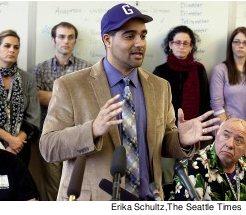The role of high-stakes standardized tests in K-12 education has dramatically expanded in recent years, shaping teachers’ workdays and narrowing what is taught to the confines of a test. Now, high school teachers in Seattle are saying “No.”
 |
On January 10, 2013, the staff of Garfield High School voted unanimously to refuse to administer the Measures of Academic Progress (MAP) test to their ninth-grade students. They’ve held firm since, even as the superintendent of schools has threatened them with a ten-day, unpaid suspension. Meanwhile, teachers at other Seattle-area schools have joined their boycott.
Allies
“Garfield has a long tradition of cultivating abstract thinking, lyrical innovation, trenchant debate, civic leadership, moral courage and myriad other qualities for which our society is desperate, yet which cannot be measured, or inspired by bubbling answer choice ‘E,’” wrote Garfield High history teacher Jesse Hagopian in a Seattle Times op-ed.
Garfield High’s Parent-Teacher-Student Association and student government are both backing the teachers, and the teachers’ union, the Seattle Education Association (an affiliate of the National Education Association), has been holding phone banks and rallies in support. NEA president Dennis van Roeckel called the teachers’ stand a “defining moment within the education profession.”
As the boycott has become national news, it has attracted support around the country. A letter in solidarity with the Garfield teachers has been signed by close to 5,000 educators, authors and activists, including former US Assistant Secretary of Education Diane Ravitch; Chicago Teachers Union President Karen Lewis; Jonathan Kozol, author of Savage Inequalities; Deborah Meier of the Coalition of Essential Schools; Pedro Noguera, professor of education at New York University; PSC President Barbara Bowen and more than a dozen faculty members at CUNY. American Federation of Teachers President Randi Weingarten issued a statement of support, which is posted on the AFT’s Facebook page.
(You can sign the petition at tinyurl.com/Seattle-test-petition.)
Firm Stand
The Seattle teachers’ firm stand has been “amazing,” Jean Anyon, professor of social and educational policy at the Graduate Center, told Clarion. “There have been very few groups that have decided to defy these tests,” she pointed out. “In terms of an outright boycott by a[n entire] school, if it’s not the first, it’s close to it.”
The MAP test was acquired for about $4 million by Seattle’s schools superintendent while she was on the board of the company that sells it; a state audit in 2011 found that she committed a serious ethics violation by failing to disclose this fact. Ninth and tenth graders in Seattle already take five additional tests required by the state, and eleventh and twelfth graders take three. The MAP is not required by the state and doesn’t affect students’ grades – but it is used to evaluate teachers, who point out that many students do not take the test seriously.
Additionally, the MAP is a computer-adaptive test (CAT), which means that if the student gets a question wrong, the next one is easier; if she gets an answer right, the next one is harder. “Students who are…sick of assessments find out quickly that if they choose random answers, the questions get easier,” writes assessment expert Jem Muldoon.
Ira Shor, a professor of English at the CUNY Graduate Center who writes on composition theory and urban education, said that many tests used in K-12 assessment “produce unreliable, unreproducible and even faked results. Yet these tests are used to judge what students know and how well teachers are doing their job.”
Rising Concerns
“All over the country, parents, teachers, superintendents, lawyers and university folks have been signing petitions and publishing articles about the grotesque misuse of high-stakes testing,” Michelle Fine, distinguished professor of psychology and urban education at the Graduate Center, told Clarion. But those protests have gained little traction, she added – in part because the Obama administration “has really endorsed the overuse of high-stakes testing on students, on teachers and on schools.”
Teachers’ opposition to the resulting distortions of education has been on the rise, and misuse of testing was a central issue in the Chicago Teachers Union strike last fall.
Seattle teachers have until February 22, 2013 before the threatened suspension would kick in. The superintendent has also announced that he’ll organize a task force to investigate possible alternatives to the testing regime and the MAP in particular, but the teachers are refusing to back down. Ravitch and other supporters have vowed to raise money for them if they are suspended.
“We know that high-stakes tests are being used to redline the poor and working class out of access to a quality education, and are used to get rid of teachers” in ways that are hard to justify, said Fine. She and many other scholars of K-12 education hope that the boycott will spread.

